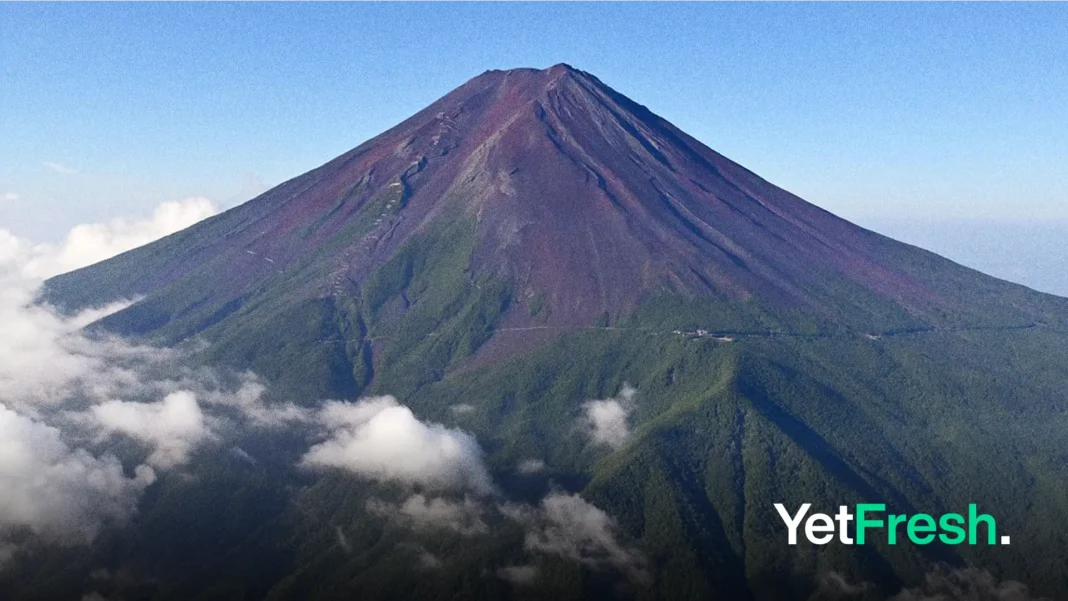TL;DR:
- Japan’s iconic Mount Fuji remains snowless, breaking a 130-year record due to unusually warm weather and the impacts of climate change.
- The lack of snow on Mount Fuji as of October 29 surpasses the previous record set on October 26 in 1955 and 2016, following Japan’s hottest summer on record.
- The delayed snowfall on Mount Fuji could signal troubling trends for the future, affecting snow accumulation, tourism, local economies, food and water availability, and allergy prevalence.
- In response to overtourism challenges, Japanese authorities introduced a tourist tax and new regulations in July, requiring climbers to pay a fee and limiting daily visitors to 4,000.
Japan’s iconic Mount Fuji remains snowless as November approaches, marking an unprecedented delay in snowfall since records began 130 years ago. This unusual phenomenon has raised concerns about the impact of climate change on one of Japan’s most cherished natural landmarks.
The 3,776-meter peak, which typically sees its first dusting of snow by early October, has yet to develop its characteristic white cap. Shinichi Yanagi, a meteorological officer at the Kofu Local Meteorological Office, attributes this delay to unseasonably warm weather. “Because of the fact that high temperatures in Japan have been continuing since the summer and as it has been raining, there has been no snowfall,” Yanagi explained.
The lack of snow as of October 29 surpasses the previous record set on October 26 in both 1955 and 2016. This delay is particularly significant as Mount Fuji’s snowcap has long been a symbol of Japan’s changing seasons and a vital indicator of the country’s climate patterns.
Japan’s Meteorological Agency reported that the country experienced its hottest summer on record this year, with average temperatures from June to August soaring 1.76 degrees Celsius above normal levels. The unusual warmth persisted into autumn, with at least 74 cities recording temperatures of 30 degrees Celsius or higher in early October.
Climate experts suggest that this extreme heat is not an isolated incident. Climate Central, a non-profit research group, found that the October heat wave in Japan was made three times more likely due to the ongoing climate crisis. This aligns with global trends, as 2024 is on track to become the hottest year in recorded history.
The absence of snow on Mount Fuji is more than just a visual change; it has far-reaching implications. The delayed snowfall could impact local tourism, water supplies, and even agricultural practices in the region. Moreover, it serves as a stark reminder of the broader effects of climate change on natural landmarks and ecosystems worldwide.
Mount Fuji, a UNESCO World Heritage site, typically welcomes millions of visitors each year during its climbing season from July to September. However, the mountain has faced challenges in recent years due to overtourism. In response, Japanese authorities implemented new regulations in July, including a tourist tax and a daily limit of 4,000 climbers.
As scientists continue to warn about the need to limit global warming to 1.5 degrees Celsius above pre-industrial levels, the situation at Mount Fuji serves as a tangible example of the changes already underway. The mountain’s bare summit stands as a powerful symbol of the urgent need for global action on climate change.
While it remains to be seen when snow will finally grace Mount Fuji’s peak this year, the record-breaking delay has already sparked important conversations about climate resilience and the preservation of natural wonders for future generations.
Source: CNN




